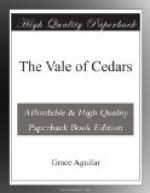Such was the triumph of prejudice achieved by the lofty-minded and generous woman, who swayed the sceptre of Castile.[A] And yet, though every history of the time unites in so portraying her; though her individual character was the noblest, the most magnanimous, the most complete union of masculine intellect with perfect womanhood, ever traced on the pages of the past; though under her public administration her kingdom stood forth the noblest, the most refined, most generous, ay, and the freest, alike in national position, as in individual sentiment, amongst all the nations of Europe, Isabella’s was the fated hand to sign two edicts[B] whose consequences extinguished the lustre, diminished the virtues, enslaved the sentiments, checked the commerce, and in a word deteriorated the whole character of Spain.
[Footnote A: We are authorized to give this character to Isabella of Castile, and annex the lustre of such action to her memory; as we know that even when, by the persuasions and representations of Torquemada, the Inquisition was publicly established, Isabella constantly interfered her authority to prevent zeal from becoming inhumanity. Rendered unusually penetrating by her peculiarly feeling and gentle nature, she discovered, what was concealed from others, “That many enormities may be committed under the veil of religion—many innocent persons falsely accused; their riches being their only crime. Her exertions brought such things to light, and the suborners were punished according to their guilt.”—WASHINGTON IRVING’S Siege of Granada.—Of Ferdinand too we are told, “Respeto la jurisdiction ecclesiastica, y conservo la real;” he respected the ecclesiastical jurisdiction, but guarded or was jealous, for that of the crown. His determination, therefore, to refuse the church’s interference in the case of Marie, though unusual to his age, is warranted by his larger mind and freer policy.]
[Footnote B: The establishment of the Inquisition, and expulsion of the Jews.]
For fourteen days affairs remained the same. At the end of that period the castle and city of Segovia were thrown anew into a state of the wildest excitement by a most mysterious occurrence—Marie had disappeared.
CHAPTER XXII.
“Meekly had he bowed and prayed,
As not disdaining priestly aid;
And while before the Prior kneeling,
His heart was weaned from earthly feeling:
No more reproach, no more despair—
No thought but heaven, no word but prayer.”
BYRON.




